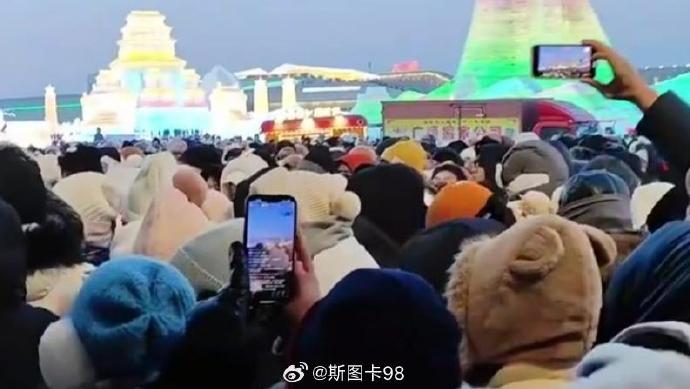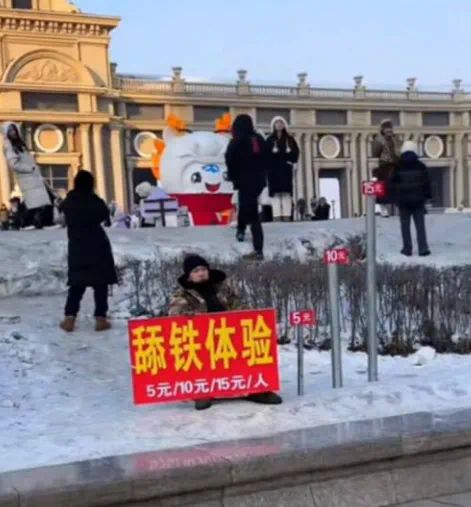China Insight
A Snowball Effect: How Cold Harbin Became the Hottest Place in China
Part of Harbin’s enormous success can be attributed to a snowball effect, but the hype is also the result of a well-coordinated campaign.
Published
7 months agoon

PREMIUM CONTENT
There is one topic that has been dominating Chinese social media recently: Harbin and its remarkable influx of tourists. How can the buzz surrounding this frosty city be explained?
The new year has just started and Harbin already seems to be the hit of 2024. The capital of China’s Heilongjiang Province, which is famous for its Ice and Snow Festival and Russian heritage, has been dominating trending topics on Chinese social media from late December well into this second week of January.
Every day recently, there’s another hashtag about Harbin that is hitting the hot charts on Chinese social media platforms Weibo, Douyin, and Xiaohongshu. Whether it is about Harbin travel, food, or funny memes, there seems to be an endless stream of stories and topics coming from the city in China’s northeast.
The sudden hype surrounding Harbin is similar to that of Zibo in 2023. The Shandong city, known for its local BBQ culture, became all the rage in spring of last year for its joyful atmosphere and post-pandemic celebratory mood.
Is Harbin the ‘Zibo’ of this 2023-2024 winter season? How come the historical city became such a social media phenomenon?
Harbin’s Hottest Festival
This year marks the 40th edition of the Harbin International Ice and Snow Festival (哈尔滨国际冰雪节), which is the largest ice and snow festival in the world. The official opening ceremony on January 5th not only celebrated the milestone of the 40th edition but also highlighted Harbin’s role as the host city for the 2025 Asian Winter Games. This will also be the first festival after the end of China’s ‘Zero Covid’ policy (the event was previously still held but kept much smaller).
Harbin winters are tough, with temperatures plummeting to as low as minus 30 degrees Celsius (minus 22 degrees Fahrenheit) or even colder. The idea for a Harbin ice festival first emerged in the late 1950s, when local officials wanted to cheer up the city and its residents in the dark and gloomy winter days.
They therefore introduced a winter festival centered around the idea of ice lanterns, of which the history goes back to the fisherman on the Songhua River using candles inside frozen blocks to give light on long winter nights. The festival was successful from the start; nearly 250,000 people participated in the 1963 edition (Dewar et al 2001, 524).

First edition of the Snow and Ice Festival in 1963.
After the Cultural Revolution put a halt to the festivities in 1966, local authorities reviewed the festival again in 1984, and revived it as an event to boost the local economy. About a decade later, it had already become one of the biggest of its kind globally, with its ice sculpting competitions and snow sculpture parks, including thousands of ice structures and spectacular lantern venues.
This 2023-2024 season turns out to be another important moment for Harbin and its ice festival. In November of 2023, the city launched a press conference in which they stressed the importance of strengthening the city’s position as an (international) leader in the field of ice and snow tourism in this post-pandemic era and fully focus on turning the season into a “people’s festival” and a “people’s event” (“使冰雪季和冰雪节真正成为人民的节日、百姓的盛会”).
From string quartets to hot air balloons, Harbin is going all out to entertain and impress visitors this year, and all the efforts are paying off.
More than two million people are expected to visit Harbin for this year’s festival, including its ‘Ice and Snow World’ (哈尔滨冰雪大世界) which opened on 18 December and will run until late February. This amusement park is a major attraction within the larger festival, and this 25th edition, with its 810,000-square-meter, is the largest-ever held.
In a time when Chinese domestic travelers are exploring their own country in new ways, from Special Force travel style to show-inspired journeys, the latest buzz surrounding Harbin is something that many simply do not want to miss out on, causing the coldest city to become one of the hottest destinations of the moment.
Turning Bad Publicity into Something Positive
On December 18, Harbin officially opened its Ice and Snow World to the public, welcoming thousands of visitors. This is also when the city and its festival first started trending on social media, but not necessarily in a good way.
Visitors initially complained that despite making reservations, they had to wait in lines at the entrance for hours, and that the time slot reservation system (分时预约) – introduced in Covid days – actually made things more difficult rather than facilitating a smoother crowd management process.

People also complained when Ice and Snow World issued a notice that they couldn’t accommodate more than 40,000 people and had already reached their limit during the early afternoon, therefore halting further ticket sales on the 18th. The 40,000 people limit seemed strange to many, who commented that other events and venues across China, such as Shanghai Disneyland, could welcome much more visitors.
People who had been waiting in line for hours starting shouting that they wanted their money back, and that incident went viral online as the “ticket refund incident” (#哈尔滨退票事件#, 170 million views on Weibo).
Not only did these incidents generate more public attention for the events taking place in Harbin, Snow World’s response also became a hot topic as they soon issued an apology, swiftly canceled the time slot reservation system, gave ticket refunds, and introduced a ‘first come first served’ system (#冰雪大世界取消预约制#, #哈尔滨冰雪大世界致歉#, 370 million views).
A side effect of this incident and how it was handled was that a so-called “underdog effect” became visible on social media, where many people started defending Harbin and Snow World. Supporters questioned whether visitors would similarly express frustration while waiting in lines at Disneyland or Universal Studios.
One Weibo blogger (@刘成春) wrote: “Please do not dismiss Harbin’s Ice and Snow World just because of some minor shortcomings. A group of simple, honest, hardworking people have spent days on end creating these sculptures with ice taken from the Songhua River at temperatures below minus 20. They’ve been making so much efforts, and Harbin just wants to present these works as gifts and the city’s signature to the people (..) Please don’t discredit the only snow and ice landmark of Northeast China.”
After the incident, this sentiment echoed widely on Chinese social media, where many believed in Harbin’s genuine efforts to make its snow and ice season a success, recognizing the sincerity and goodwill of those involved. The idea that Harbin really deserves to shine this season was further strengthened because of videos emerging on social media of previous Covid years, when the smaller festival looked empty and staff still worked hard to try and entertain the few visitors that were there.
Southern Little Potato Hype
On New Year’s Eve, videos showing celebrations in Harbin rapidly gained traction online, showing that Harbin was doing everything it could to entertain and create a welcoming atmosphere for its visitors.
Looks like Harbin is ready for 2024. 🥳 pic.twitter.com/VjBF5eQdMH
— Manya Koetse (@manyapan) December 31, 2023
These visitors have also become part of the buzz surrounding Harbin this season, mainly the emergence of the so-called “Southern Little Potatoes” (南方小土豆 nánfāng xiǎo tǔdòu). This term refers to the increasing influx of tourists from China’s warmer southern regions who are making their way to the snow-blanketed north.
The term “Southern Little Potatoes” humorously describes these southern tourists, especially women, who are frequently spotted sporting light-colored down jackets and hats. Their short height, distinct travel attire makes them stand out among the typically taller and darker-dressed locals in northeastern cities, leading to the playful potato comparison by northerners.

One of the ‘Southern Little Potatoes’ memes (via 21jingji.com).
As “Southern Little Potatoes” became a trending term online, southern tourists also started using it to make fun of themselves and it came to be used to highlight the warm and sometimes funny exchanges between the north and south.
The “Southern Little Potatoes,” who are not used to not used to ice, snow, and extremely cold weather, are also known to get into tricky situations, needing locals to help them out. On January 9, one tourist from the south went viral for stepping out of the train as he quickly wanted to experience licking a metal pole in freezing temperatures. The moment his tongue got stuck, the train staff kindly helped him get unstuck.
Just a short reminder not to lick metal poles in freezing temperatures. Some Chinese southern tourists couldn't resist the urge when visiting the cold north, but of course, these silly "little southern potatoes" (南方小土豆) need help in getting rescued. 😝 #Harbin pic.twitter.com/0bqlMMf3KQ
— Manya Koetse (@manyapan) January 10, 2024
For locals, these silly southern tourists are a great business opportunity. One street seller started offering a supervised metal pole licking experience: you can lick a small metal pole for 5 yuan ($0.70), a bigger one for 10 ($1.40), and the tallest one for 15 ($2) (photo below).

Metal pole licking experience.
The Southern Little Potato trend has set off the online meme machine, as well as sparked a small local economy. Some Harbin taxi drivers, for example, promote themselves as being designated “little potato drivers” to serve their ‘friends from the south.’ Street sellers selling ‘little potato’ plush toy keychains for 15 yuan became all the hype.

Little Potato merchandise sold in the streets of Harbin (via 21jingji.com).
You could say that this general trend has also strengthened ties between the north and south. In Chinese, Harbin (Hā’ěrbīn 哈尔滨) is now affectionately shortened to ‘Ěrbīn‘ by visitors and netizens, with the dropping of the ‘Ha’ reflecting a more casual, friendly familiarity with the city.
A Snowball Effect
Although part of Harbin’s enormous (online) success can be attributed to a snowball effect that began after December 19/20, with people showing their appreciation for the city and joining the hype, the attention on social media was also a result of a well-coordinated campaign.
As described by Chinese media outlet The Paper (澎湃新闻), Heilongjiang Province’s Cultural and Tourism Department Party Secretary and Director He Jing (何晶) recently stated in an interview: “This year’s popularity [of Harbin] isn’t accidental; we’ve been preparing for a year.” He explained how, since early 2023, they started focusing on new media and social media strategies to promote Heilongjiang and Harbin in multiple ways.
For this season, Harbin Snow World made sure there were several online influencers and celebrities promoting the festivities, such as Chinese influencers Kiki (陈洁Kiki) and Barbin (Barbin.ili芭比) or Olympic champion speed skaters Fan Kexin (范可新), Zhang Hong (张虹), and Zhang Yuting (张雨婷). There are also various brand collaborations, such as with Tencent and its Game for Peace (和平精英). Local official media channels and big state media accounts also collaborate with Harbin in posting a lot of promotional videos related to festivities.
This year, Harbin also introduced all kinds of activities and venues to increase their appeal. The ice-made terracotta warriors, for example, or the hot pot restaurant housed within an ice structure, where even the tables are sculpted from ice. These are just some of the many ‘must-experience’ attractions in Harbin that have garnered attention on Chinese social media (#哈尔滨把火锅玩出了本地特色#).
Harbin has been trending on Chinese social media every single day for two weeks now. It's the Zibo of the 2023-2024 winter season. Among all the things that are hyped, I love the idea of having spicy hotpot within an ice restaurant. Warm tummy, cold face. There's a beer bar, too! pic.twitter.com/9ea9XzXmk8
— Manya Koetse (@manyapan) January 11, 2024
There is also a 20-meter high snowman wearing a red hat, that has come to serve as a must-go photo opportunity for visitors. The local tourism ambassador, the Exploring Pinguin (淘学企鹅), with its cute appearance and orange backpack, is also one of those things that further adds to the appeal of Harbin and its Snow World.
Local authorities, including the tourism department, also pulled out all the stops to ensure visitors felt welcome and accommodated. They made sure local hotels and other business maintained fair prices despite the surge in tourists and to increase the focus on customer service.
They also made sure to listen to (online) feedback and quickly act on complaints. For example, after so many tourists from the south arrived at Harbin Airport and had to change into warmer clothing in the chilly central hall, they increased the number of airport dressing rooms, equipped with seats, mirrors, and carpets. This kind of attention to detail and drive to serve visitors is a strategy that has greatly contributed to Harbin’s current success.
You now see that the combined efforts of local authorities and businesses in Harbin, both online and offline, have cultivated a unique festive atmosphere. This atmosphere is contagious; it motivates locals to actively contribute to maintain the standards while also encouraging visitors to actively promote the city. This leads to new groups of visitors getting enthusiastic to travel to Harbin.
While this success is partly orchestrated, with authorities and state media being key players, there is also that ‘special something’ — a kind of genuine charm, sincerity, relatability, and likability — which is much harder to schedule through strategies. It’s an organic ingredient that is a major part of the buzz. In this way, Zibo and Harbin are very much alike.
Despite some criticisms about prioritizing short-term fame and social media hype for Chinese tourist destinations, it seems that Harbin’s success will be long lasting. As some social media users say: “I can’t make it this year, but I definitely will go to Harbin for the next season. I’ve never even seen snow in my life.”
By Manya Koetse, with contributions by Ruixin Zhang and Miranda Barnes
Get the story behind the hashtag. Subscribe to What’s on Weibo here to receive our newsletter and get access to our latest articles:
References
Dewar, Keith, Denny Meyer, and Wen Mei Li. 2001. “Harbin, Lanterns of Ice, Sculptures of Snow.” Tourism Management 22 (5): 523-532.
Spotted a mistake or want to add something? Please let us know in comments below or email us. First-time commenters, please be patient – we will have to manually approve your comment before it appears.
©2024 Whatsonweibo. All rights reserved. Do not reproduce our content without permission – you can contact us at info@whatsonweibo.com.
Manya Koetse is the founder and editor-in-chief of whatsonweibo.com. She is a writer, public speaker, and researcher (Sinologist, MPhil) on social trends, digital developments, and new media in an ever-changing China, with a focus on Chinese society, pop culture, and gender issues. She shares her love for hotpot on hotpotambassador.com. Contact at manya@whatsonweibo.com, or follow on Twitter.

Also Read
China Insight
The Tragic Story of “Fat Cat”: How a Chinese Gamer’s Suicide Went Viral
The story of ‘Fat Cat’ has become a hot topic in China, sparking widespread sympathy and discussions online.
Published
3 months agoon
May 9, 2024
The tragic story behind the recent suicide of a 21-year-old Chinese gamer nicknamed ‘Fat Cat’ has become a major topic of discussion on Chinese social media, touching upon broader societal issues from unfair gender dynamics to businesses taking advantage of grieving internet users.
The story of a 21-year-old Chinese gamer from Hunan who committed suicide has gone completely viral on Weibo and beyond this week, generating many discussions.
In late April of this year, the young man nicknamed ‘Fat Cat’ (胖猫 Pàng Māo, literally fat or chubby cat), tragically ended his life by jumping into the river near the Chongqing Yangtze River Bridge (重庆长江大桥) following a breakup with his girlfriend. By now, the incident has come to be known as the “Fat Cat Jumping Into the River Incident” (胖猫跳江事件).
News of his suicide soon made its rounds on the internet, and some bloggers started looking into what was behind the story. The man’s sister also spoke out through online channels, and numerous chat records between the young man and his girlfriend emerged online.
One aspect of his story that gained traction in early May is the revelation that the man had invested all his resources into the relationship. Allegedly, he made significant financial sacrifices, giving his girlfriend over 510,000 RMB (approximately 71,000 USD) throughout their relationship, in a time frame of two years.
When his girlfriend ended the relationship, despite all of his efforts, he was devastated and took his own life.
The story was picked up by various Chinese media outlets, and prominent social and political commentator Hu Xijin also wrote a post about Fat Cat, stating the sad story had made him tear up.
As the news spread, it sparked a multitude of hashtags on Weibo, with thousands of netizens pouring out their thoughts and emotions in response to the story.
Playing Games for Love
The main part of this story that is triggering online discussions is how ‘Fat Cat,’ a young man who possessed virtually nothing, managed to provide his girlfriend, who was six years older, with such a significant amount of money – and why he was willing to sacrifice so much in order to do so.
The young man reportedly was able to make money by playing video games, specifically by being a so-called ‘booster’ by playing with others and helping them get to a higher level in multiplayer online battle games.
According to his sister, he started working as a ‘professional’ video gamer as a means of generating money to satisfy his girlfriend, who allegedly always demanded more.
He registered a total of 36 accounts to receive orders to play online games, making 20 yuan per game (about $2.80). Because this consumed all of his time, he barely went out anymore and his social life was dead.
In order to save more money, he tried to keep his own expenses as low as possible, and would only get takeout food for himself for no more than 10 yuan ($1,4). His online avatar was an image of a cat saying “I don’t want to eat vegetables, I want to eat McDonald’s.”

The woman in question who he made so many sacrifices for is named Tan Zhu (谭竹), and she soon became the topic of public scrutiny. In one screenshot of a chat conversation between Tan and her boyfriend that leaked online, she claimed she needed money for various things. The two had agreed to get married later in this year.
Despite of this, she still broke up with him, driving him to jump off the bridge after transferring his remaining 66,000 RMB (9135 USD) to Tan Zhu.
As the story fermented online, Tan Zhu also shared her side of the story. She claimed that she had met ‘Fat Cat’ over two years ago through online gaming and had started a long distance relationship with him. They had actually only met up twice before he moved to Chongqing. She emphasized that financial gain was never a motivating factor in their relationship.
Tan additionally asserted that she had previously repaid 130,000 RMB (18,000 USD) to him and that they had reached a settlement agreement shortly before his tragic death.
Ordering Take-Out to Mourn Fat Cat
– “I hope you rest in peace.”
– “Little fat cat, I hope you’ll be less foolish in your next life.”
– “In your next life, love yourself first.”
These are just a few of the messages left by netizens on notes attached to takeout food deliveries near the Chongqing Yangtze River Bridge.

AI-generated image spread on Chinese social media in connection to the event.
As Fat Cat’s story stirred up significant online discussion, with many expressing sympathy for the young man who rarely indulged in spending on food and drinks, some internet users took the step of ordering McDonalds and other food delivery services to the bridge, where he tragically jumped from, in his honor.
This soon snowballed into more people ordering food and drinks to the bridge, resulting in a constant flow of delivery staff and a pile-up of take-out bags.

Delivery food on the bridge, photo via Weibo.
However, as the food delivery efforts picked up pace, it came to light that some of the deliveries ordered and paid for were either empty or contained something different; certain restaurants, aware of the collective effort to honor the young man, deliberately left the food boxes empty or substituted sodas or tea with tap water.

At least five restaurants were caught not delivering the actual orders. Chinese bubble tea shop ChaPanda was exposed for substituting water for milk tea in their cups. On May 3rd, ChaPanda responded that they had fired the responsible employee.
Another store, the Zhu Xiaoxiao Luosifen (朱小小螺蛳粉), responded on that they had temporarily closed the shop in question to deal with the issue. Chinese fast food chain NewYobo (牛约堡) also acknowledged that at least twenty orders they received were incomplete.
Fast food company Wallace (华莱士) responded to the controversy by stating they had dismissed the employees involved. Mixue Ice Cream & Tea (蜜雪冰城) issued an apology and temporarily closed one of their stores implicated in delivering empty orders.
In the midst of all the controversy, Fat Cat’s sister asked internet users to refrain from ordering take-out food as a means of mourning and honoring her brother.
Nevertheless, take-out food and flowers continued to accumulate near the bridge, prompting local authorities to think of ways of how to deal with this unique method of honoring the deceased gamer.
Gamer Boy Meets Girl
On Chinese social media, this story has also become a topic of debate in the context of gender dynamics and social inequality.
There are some male bloggers who are angry with Tan Zhu, suggesting her behaviour is an example of everything that’s supposedly “wrong” with Chinese women in this day and age.
Others place blame on Fat Cat for believing that he could buy love and maintain a relationship through financial means. This irked some feminist bloggers, who see it as a chauvinistic attitude towards women.
A main, recurring idea in these discussions is that young Chinese men such as Fat Cat, who are at the low end of the social ladder, are actually particularly vulnerable in a fiercely competitive society. Here, a gender imbalance and surplus of unmarried men make it easier for women to potentially exploit those desperate for companionship.
The story of Fat Cat brings back memories of ‘Mo Cha Official,’ a not-so-famous blogger who gained posthumous fame in 2021 when details of his unhappy life surfaced online.
Likewise, the tragic tale of WePhone founder Su Xiangmao (苏享茂) resurfaces. In 2017, the 37-year-old IT entrepreneur from Beijing took his own life, leaving behind a note alleging blackmail by his 29-year-old ex-wife, who demanded 10 million RMB (±1.5 million USD) (read story).
Another aspect of this viral story that is mentioned by netizens is how it gained so much attention during the Chinese May holidays, coinciding with the tragic news of the southern China highway collapse in Guangdong. That major incident resulted in the deaths of at least 48 people, and triggered questions over road safety and flawed construction designs. Some speculate that the prominence given to the Fat Cat story on trending topic lists may have been a deliberate attempt to divert attention away from this incident.
‘Fat Cat’ was cremated. His family stated their intention to take necessary legal steps to recover the money from his former girlfriend, but Tan Zhu reportedly already reached an agreement with the father and settled the case. Nevertheless, the case continues to generate discussions online, with some people wondering: “Is it over yet? Can we talk about something different now?”

Fat Cat images projected in Times Square
However, given that images of the ‘Fat Cat’ avatar have even appeared in Times Square in New York by now (Chinese internet users projected it on one of the big LED screens), it’s likely that this story will be remembered and talked about for some time to come.
UPDATE MAY 25
On May 20, local authorities issued a lengthy report to clarify the timeline of events and details surrounding the death of “Fat Cat,” which had attracted significant attention across China.
The report concluded that there was no fraud involved and that “Fat Cat” and his girlfriend were in a genuine relationship. Tan did not deceive “Fat Cat” for money; the transfers were voluntary. Furthermore, Tan returned most of the money to his parents.
The gamer’s sister is reportedly still being investigated for potentially infringing on Tan’s privacy by disclosing numerous private details to the public.
In the end, one thing is clear in this gamer’s tragic story, which is that there are no winners.
By Manya Koetse
– With contributions by Miranda Barnes and Ruixin Zhang
Independently reporting China trends for over a decade. Like what we do? Support us and get the story behind the hashtag by subscribing:
Spotted a mistake or want to add something? Please let us know in comments below or email us. First-time commenters, please be patient – we will have to manually approve your comment before it appears.
©2024 Whatsonweibo. All rights reserved. Do not reproduce our content without permission – you can contact us at info@whatsonweibo.com.
China Brands, Marketing & Consumers
A Brew of Controversy: Lu Xun and LELECHA’s ‘Smoky’ Oolong Tea
Chinese tea brand LELECHA faced backlash for using the iconic literary figure Lu Xun to promote their “Smoky Oolong” milk tea, sparking controversy over the exploitation of his legacy.
Published
3 months agoon
May 3, 2024
It seemed like such a good idea. For this year’s World Book Day, Chinese tea brand LELECHA (乐乐茶) put a spotlight on Lu Xun (鲁迅, 1881-1936), one of the most celebrated Chinese authors the 20th century and turned him into the the ‘brand ambassador’ of their special new “Smoky Oolong” (烟腔乌龙) milk tea.
LELECHA is a Chinese chain specializing in new-style tea beverages, including bubble tea and fruit tea. It debuted in Shanghai in 2016, and since then, it has expanded rapidly, opening dozens of new stores not only in Shanghai but also in other major cities across China.
Starting on April 23, not only did the LELECHA ‘Smoky Oolong” paper cups feature Lu Xun’s portrait, but also other promotional materials by LELECHA, such as menus and paper bags, accompanied by the slogan: “Old Smoky Oolong, New Youth” (“老烟腔,新青年”). The marketing campaign was a joint collaboration between LELECHA and publishing house Yilin Press.

Lu Xun featured on LELECHA products, image via Netease.
The slogan “Old Smoky Oolong, New Youth” is a play on the Chinese magazine ‘New Youth’ or ‘La Jeunesse’ (新青年), the influential literary magazine in which Lu’s famous short story, “Diary of a Madman,” was published in 1918.
The design of the tea featuring Lu Xun’s image, its colors, and painting style also pay homage to the era in which Lu Xun rose to prominence.
Lu Xun (pen name of Zhou Shuren) was a leading figure within China’s May Fourth Movement. The May Fourth Movement (1915-24) is also referred to as the Chinese Enlightenment or the Chinese Renaissance. It was the cultural revolution brought about by the political demonstrations on the fourth of May 1919 when citizens and students in Beijing paraded the streets to protest decisions made at the post-World War I Versailles Conference and called for the destruction of traditional culture[1].
In this historical context, Lu Xun emerged as a significant cultural figure, renowned for his critical and enlightened perspectives on Chinese society.
To this day, Lu Xun remains a highly respected figure. In the post-Mao era, some critics felt that Lu Xun was actually revered a bit too much, and called for efforts to ‘demystify’ him. In 1979, for example, writer Mao Dun called for a halt to the movement to turn Lu Xun into “a god-like figure”[2].
Perhaps LELECHA’s marketing team figured they could not go wrong by creating a milk tea product around China’s beloved Lu Xun. But for various reasons, the marketing campaign backfired, landing LELECHA in hot water. The topic went trending on Chinese social media, where many criticized the tea company.
Commodification of ‘Marxist’ Lu Xun
The first issue with LELECHA’s Lu Xun campaign is a legal one. It seems the tea chain used Lu Xun’s portrait without permission. Zhou Lingfei, Lu Xun’s great-grandson and president of the Lu Xun Cultural Foundation, quickly demanded an end to the unauthorized use of Lu Xun’s image on tea cups and other merchandise. He even hired a law firm to take legal action against the campaign.
Others noted that the image of Lu Xun that was used by LELECHA resembled a famous painting of Lu Xun by Yang Zhiguang (杨之光), potentially also infringing on Yang’s copyright.
But there are more reasons why people online are upset about the Lu Xun x LELECHA marketing campaign. One is how the use of the word “smoky” is seen as disrespectful towards Lu Xun. Lu Xun was known for his heavy smoking, which ultimately contributed to his early death.
It’s also ironic that Lu Xun, widely seen as a Marxist, is being used as a ‘brand ambassador’ for a commercial tea brand. This exploits Lu Xun’s image for profit, turning his legacy into a commodity with the ‘smoky oolong’ tea and related merchandise.
“Such blatant commercialization of Lu Xun, is there no bottom limit anymore?”, one Weibo user wrote. Another person commented: “If Lu Xun were still alive and knew he had become a tool for capitalists to make money, he’d probably scold you in an article. ”
On April 29, LELECHA finally issued an apology to Lu Xun’s relatives and the Lu Xun Cultural Foundation for neglecting the legal aspects of their marketing campaign. They claimed it was meant to promote reading among China’s youth. All Lu Xun materials have now been removed from LELECHA’s stores.

Statement by LELECHA.
On Chinese social media, where the hot tea became a hot potato, opinions on the issue are divided. While many netizens think it is unacceptable to infringe on Lu Xun’s portrait rights like that, there are others who appreciate the merchandise.
The LELECHA controversy is similar to another issue that went trending in late 2023, when the well-known Chinese tea chain HeyTea (喜茶) collaborated with the Jingdezhen Ceramics Museum to release a special ‘Buddha’s Happiness’ (佛喜) latte tea series adorned with Buddha images on the cups, along with other merchandise such as stickers and magnets. The series featured three customized “Buddha’s Happiness” cups modeled on the “Speechless Bodhisattva” (无语菩萨), which soon became popular among netizens.

The HeyTea Buddha latte series, including merchandise, was pulled from shelves just three days after its launch.
However, the ‘Buddha’s Happiness’ success came to an abrupt halt when the Ethnic and Religious Affairs Bureau of Shenzhen intervened, citing regulations that prohibit commercial promotion of religion. HeyTea wasted no time challenging the objections made by the Bureau and promptly removed the tea series and all related merchandise from its stores, just three days after its initial launch.
Following the Happy Buddha and Lu Xun milk tea controversies, Chinese tea brands are bound to be more careful in the future when it comes to their collaborative marketing campaigns and whether or not they’re crossing any boundaries.
Some people couldn’t care less if they don’t launch another campaign at all. One Weibo user wrote: “Every day there’s a new collaboration here, another one there, but I’d just prefer a simple cup of tea.”
By Manya Koetse
[1]Schoppa, Keith. 2000. The Columbia Guide to Modern Chinese History. New York: Columbia UP, 159.
[2]Zhong, Xueping. 2010. “Who Is Afraid Of Lu Xun? The Politics Of ‘Debates About Lu Xun’ (鲁迅论争lu Xun Lun Zheng) And The Question Of His Legacy In Post-Revolution China.” In Culture and Social Transformations in Reform Era China, 257–284, 262.
Independently reporting China trends for over a decade. Like what we do? Support us and get the story behind the hashtag by subscribing:
Spotted a mistake or want to add something? Please let us know in comments below or email us. First-time commenters, please be patient – we will have to manually approve your comment before it appears.
©2024 Whatsonweibo. All rights reserved. Do not reproduce our content without permission – you can contact us at info@whatsonweibo.com.
Subscribe

Weibo Watch: The Future is Here

“Bye Bye Biden”: Biden’s Many Nicknames in Chinese

Enjoying the ‘Sea’ in Beijing’s Ditan Park

A Triumph for “Comrade Trump”: Chinese Social Media Reactions to Trump Rally Shooting

Weibo Watch: Get Up, Stand Up

The Tragic Story of “Fat Cat”: How a Chinese Gamer’s Suicide Went Viral

“Old Bull Eating Young Grass”: 86-Year-Old Chinese Painter Fan Zeng Marries 36-Year-Old Xu Meng

A Brew of Controversy: Lu Xun and LELECHA’s ‘Smoky’ Oolong Tea

Singing Competition or Patriotic Fight? Hunan TV’s ‘Singer 2024’ Stirs Nationalistic Sentiments

Zara Dress Goes Viral in China for Resemblance to Haidilao Apron

Weibo Watch: The Battle for the Bottom Bed

About the “AI Chatbot Based on Xi Jinping” Story

China’s Intensified Social Media Propaganda: “Taiwan Must Return to Motherland”

Weibo Watch: Telling China’s Stories Wrong

Saying Goodbye to “Uncle Wang”: Wang Wenbin Becomes Chinese Ambassador to Cambodia
Get in touch
Would you like to become a contributor, or do you have any tips or suggestions? Get in touch here!
Popular Reads
-

 China Insight3 months ago
China Insight3 months agoThe Tragic Story of “Fat Cat”: How a Chinese Gamer’s Suicide Went Viral
-

 China Music4 months ago
China Music4 months agoThe Chinese Viral TikTok Song Explained (No, It’s Not About Samsung)
-

 China Digital10 months ago
China Digital10 months agoToo Sexy for Weibo? Online Discussions on the Concept of ‘Cābiān’
-

 China Arts & Entertainment12 months ago
China Arts & Entertainment12 months agoBehind 8 Billion Streams: Who is Dao Lang Cursing in the Chinese Hit Song ‘Luocha Kingdom’?




